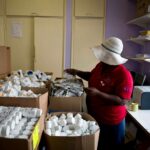“Mind the gap” – The crippling impact of HIV/AIDS on family composition and elderly Malawians
Published on June 23, 2012 at 8:04 AM by FACE OF MALAWI
By Karissa Gall (Journalists for Human Rights)
The old “respect your elders” adage has customarily been an important part of Malawian culture, with the elderly able to depend on the social and economic support of their children and the community. However, the HIV/AIDS epidemic has had a crippling impact on family composition and tradition.
While the 2012 Malawi Country AIDS Response Progress Report found that from the start of the epidemic the number of deaths per annum had been reduced from nearly 100,000 to approximately 48,000 in 2010, the report also found that the number of children orphaned by AIDS has been on the rise.
Antenatal Clinic sero-surveys (surveys of blood serum) found that the number of children orphaned by AIDS increased from 576,458 in 2010 to 612,908 in 2011. And with over half of orphans being cared for by their grandparents, men like Lucius Dimiano of Kafupa Village will be celebrating their 70th birthday before that of their retirement.
At 68-years-old, Dimiano is still working three jobs to support six grandchildren orphaned by AIDS. He works as a guard from 6 p.m. to 6 a.m. at a nearby church, goes to the garden to get maize for his family, weaves baskets to sell at the market and then, does it all over again.
“I cannot sleep, so it’s hard,” Dimiano said. “As a night guard, I need to always be awake because sometimes there are thieves in the dark.
In the same township of Chigumula, 55-year-old Mrs. Kandikole has also lost children to AIDS; her oldest daughter passed away in 2005 orphaning one grandchild, and her second oldest daughter passed away in 2010 orphaning three grandchildren.
“I’m the one who’s left looking out for them,” she said. “And not only those four; I have other grandchildren at my home who have only a mother but not a father.
“It’s very difficult for me to look after these children because I’m very old. I’m not working,” she continued. “Things are very expensive here in Malawi. Food is very expensive. I cannot manage to buy clothes for them. It is very difficult for me to take them to the hospital. To get good medicine, one needs to pay money at private hospitals, but I can’t manage to do all those things.”
Kandikole said she had been working at a nursery school, but had to quit when her daughters died because “(her) grandchildren were alone, so (she) had to look after these children all by (herself).”
She said her husband, 57, is still working as a telephone operator but “he makes very little money.”
“I don’t think he will be able to continue working much longer because he is now 57 years old and his body is very weak. He is very sick,” she said, adding that they both suffer from chronic bouts of malaria. “Before, we could manage to do all those things, but not now.”
Without the proper means or support, Kandikole said she “couldn’t manage to send (her) grandchildren to school, because when you want to send a child to school these days, even a government school, you need to buy a uniform, pencils, exercise books and the child needs to eat porridge.”
She said her grandchildren “were just staying at home” until they were accepted at the Jacaranda School for Orphans in Limbe, a free primary and secondary school in Malawi providing education and daily meals to orphans.
“If we did not have Jacaranda, these children would just be doing nothing at home,” she said. “They go to school without taking anything. If Jacaranda didn’t provide porridge I don’t know what we could do. Before, I thought my children would go to school up to college and help their children by themselves. But their deaths brought everything down.”
The late Nelley Daniel M’maligeni of Che Mboma Village suffered in the same way.
Deaf and blind, M’maligeni struggled to care for herself yet alone her grandson, Vincent, who was orphaned by AIDS. In March, at the age of 105, M’maligeni passed away and Vincent lost another primary caretaker.
M’maligeni’s daughter-in-law said her family was able to give extra food to M’maligeni and Vincent once a week, but “sometimes it (was) hard because there (was) not enough money. Sometimes M’maligeni (could) not eat.
“Sometimes we just (bought) panado, because panado is cheap,” she said.
Dimiano, Kandikole and M’maligeni are each representative of the ways that elderly Malawians are struggling to survive in the wake of the HIV/AIDS epidemic. According to the Catholic University of Malawi’s December 2010 report “Impact of HIV and AIDS on the elderly: a case study of Chiladzulu district,” 59 percent of the enrolled elderly people had difficulty sourcing money for school uniforms, food and hospital bills for orphaned grandchildren; 55 percent were affected through the sickness and death of their children; and 22 percent had to halt their own development to take care of orphaned grandchildren, spending their reserved resources to make the lives of their grandchildren better while impoverishing themselves in the process.
When asked if there can be greater relief for elderly Malawians struggling to care for themselves and their orphaned grandchildren than panado, an over-the-counter pain medication, Finance Minister Ken Lipenga said that government has put in place safety net programmes that target both the elderly and other vulnerable people in the 2012/13 National Budget.
“These programmes are aimed at assisting the poorest in our communities to cope with life,” he said, adding that during the 2012/13 fiscal year programmes will be scaled up to capture those that may have fallen below the poverty line due to devaluation.
“A total of K27.5 billion has been provided for four programmes, mainly the Intensive Public Works Programme, the School Feeding Programme targeted towards 980,000 pupils in primary schools, the Schools Bursaries Programme targeting 16,480 needy students, and the Social Cash Transfer Programme which will reach over 30,000 households across the country.”
As Dimiano put it: “If I still had children that could help me, I could have just stayed home, but there is no one to help me, I’m only working because of my grandchildren.
“The only ones who can decide if I stop working are my grandchildren. Maybe they will see that we are very old and cannot work anymore and they will help us. But maybe they will finish school and go away.
“At the moment, I do not know.”
Source:


